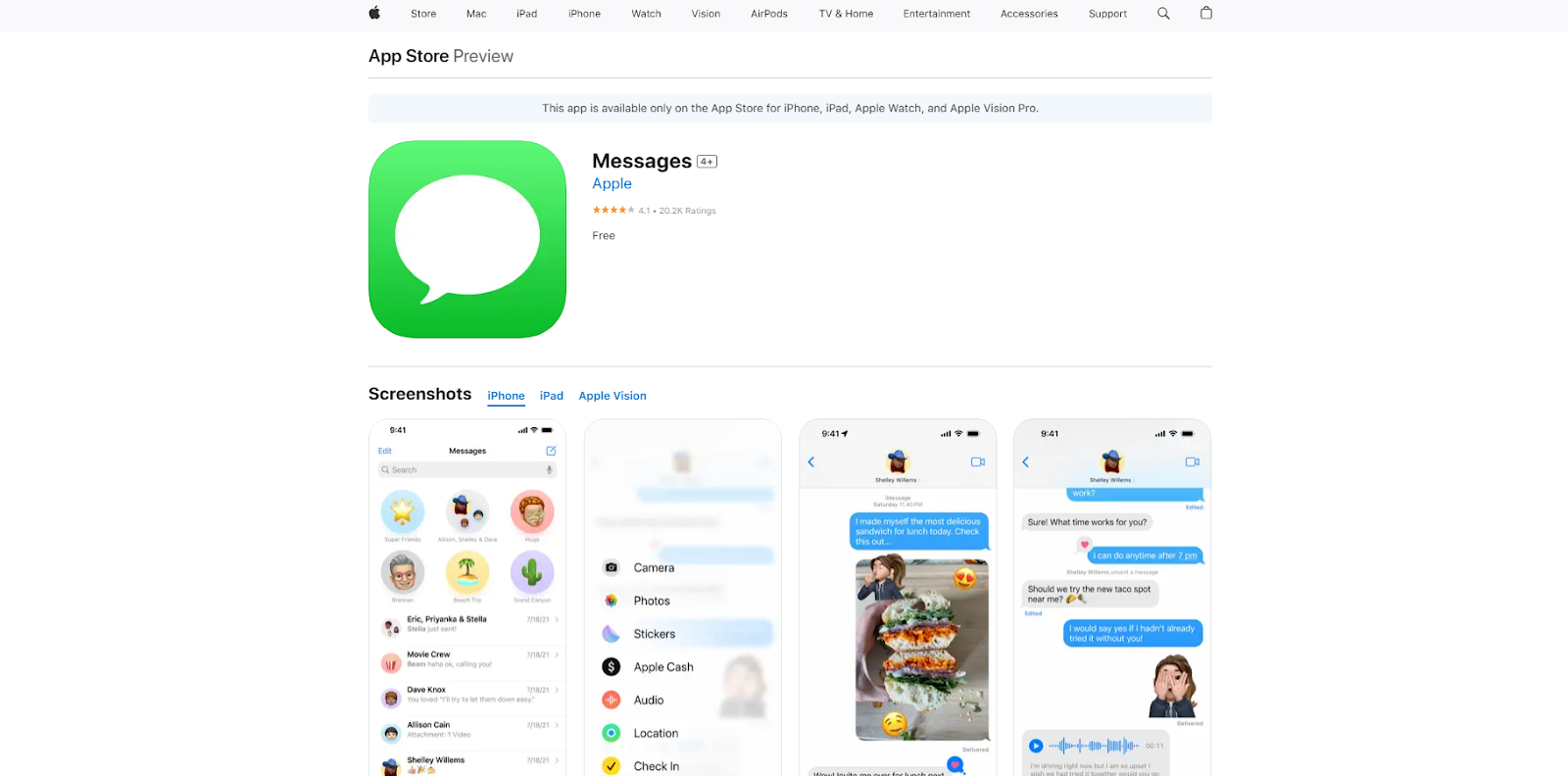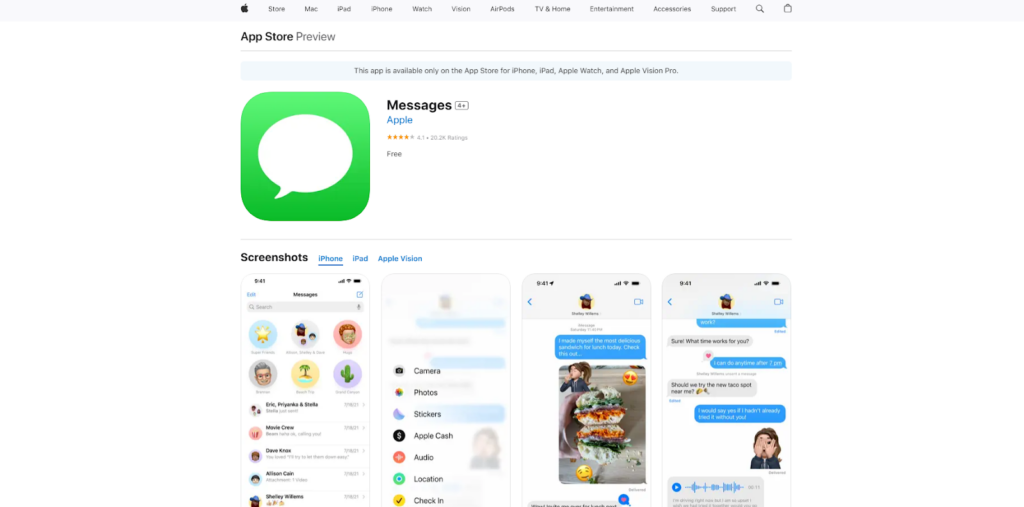Is iMessage Safe?
Laura Martisiute
Reading time: 7 minutes

Table of Contents
If you use or plan to use iMessage, you need to know: Is iMessage safe?
Below, we explain whether iMessage is:
- Safe to use.
- Good for privacy.
We also look at some steps you can take to improve both your safety and privacy when using this messaging service.
What Is iMessage?
iMessage is Apple’s instant messaging service, built into the Messages app on iOS, iPadOS, macOS, and watchOS devices. It allows users to send text messages, photos, videos, documents, and more over the internet rather than through traditional SMS or MMS messaging.

In the Messages app, iMessages are displayed in blue bubbles, while traditional SMS/MMS messages appear in green bubbles. If you send a message to a non-Apple device, the app automatically switches to SMS/MMS.
Users can create group chats within iMessage, where multiple participants can exchange messages, media, and more. Group chats also support features like naming the group, adding/removing participants, and customizing notifications.
Is iMessage Safe?
Depends on who you ask.
iMessage uses end-to-end encryption for all messages sent between Apple devices. This means that only the sender and the recipient can read the contents of the messages, as they are encrypted on the sender’s device and decrypted only on the recipient’s device.
Even Apple cannot access the content of these messages. All multimedia content, such as photos, videos, documents, and message effects (like animations), are encrypted just like text messages.
Messages are encrypted on your device and stored securely. If you use iCloud Backup to store your iMessage data, those backups are also encrypted.
However, unlike the messages themselves, Apple holds the encryption keys for iCloud backups, meaning they could theoretically access your messages if legally required. The good news is that users can turn on Advanced Data Protection for iCloud.
At the start of 2024, Apple announced that it was introducing the PQ3 post-quantum cryptographic protocol.

Apple has defined a taxonomy to classify messaging encryption protocols based on their security properties:
- Level 0: No end-to-end encryption or quantum security
- Level 1: End-to-end encryption but no quantum security
- Level 2: End-to-end encryption with post-quantum security only during initial key establishment
- Level 3: End-to-end encryption with post-quantum security throughout the conversation
With PQ3, iMessage becomes, according to Apple, the first widely deployed messaging protocol to achieve Level 3 security. This means it uses post-quantum cryptography not just for the initial key exchange but throughout the entire conversation, providing robust protection against even sophisticated quantum attacks.
Apple regularly updates iOS and macOS with security patches that help protect iMessage from vulnerabilities.
iMessage includes features to filter and report spam or unwanted messages. You can block senders or report spam directly from the Messages app. It also attempts to protect users from phishing by showing previews of links and trying to detect suspicious URLs.
When you sign in to iMessage on a new device, Apple sends a verification code to your other trusted devices. This ensures that only devices you control can access your iMessage account.
There have not been any major data breaches associated with iMessage at the time of writing.
Is iMessage Private?
Again, depends on your definition of “private.”
Apple says that it is “committed to protecting your data.”
In its “Messages & Privacy” page, Apple says that it might record and store some information about your use of the iMessage service, such as how you use it without identifying you.
Apple might also store iMessages that couldn’t be delivered for up to 30 days for redelivery.
Apple does not use iMessage data for targeted advertising or share iMessage data with third parties for marketing or advertising purposes.
You can set messages to delete automatically after 30 days, one year, or never.
If you use iCloud Backup, your iMessages are included in these backups. While these backups are encrypted, Apple holds the encryption keys, which means they could theoretically access your messages if required by law. For more privacy, turn on Advanced Data Protection or turn off the iCloud backup.
In 2024, a man sued Apple because the messages he deleted from his iPhone were still visible on a shared family iMac and were seen by his wife.
Apple’s privacy policy, which encompasses all of its products, including iMessages, receives a “Grade D” from Terms of Service; Didn’t Read (ToS;DR), a project that rates internet services’ terms of service and privacy policies. This means, “The terms of service are very uneven or there are some important issues that need your attention.”
How to Improve Your Safety and Privacy On iMessage
Follow the steps below for a more private and secure experience while using iMessage.
- Keep messages off iCloud. Turn off the “Messages” option in iCloud settings to prevent your iMessages from being included in iCloud backups. This ensures that your messages are stored only on your device, keeping them out of Apple’s cloud storage. Alternatively, enable Advanced Data Protection.
- Secure your Apple ID. Enable two-factor authentication for your Apple ID. This adds an extra layer of security, ensuring that only you can access your iMessage account and associated Apple services.
- Keep your read status private. Turn off read receipts so that others can’t see when you’ve read their messages. This gives you more control over your communication without feeling pressured to respond immediately.
- Protect sensitive information. Go to your notification settings and choose to hide message previews on the lock screen or set them to “When Unlocked.” This prevents others from seeing the content of your messages if they glance at your locked device.
- Auto-delete old messages. Set messages to automatically delete after 30 days or one year. This reduces the amount of stored data on your device, minimizing potential exposure if your device is compromised.
- Manually clear conversations. Regularly delete sensitive messages or entire conversations that you no longer need. This ensures that private information is not unnecessarily stored on your device.
- Avoid unwanted messages. Enable the “Filter Unknown Senders” option in the Messages settings. This separates messages from people not in your contacts, reducing the risk of spam or phishing attempts reaching your main inbox.
- Protect your privacy from unwanted interactions. If you receive messages from unknown or unwanted contacts, use the blocking feature to prevent further communication. You can also report spam directly from the Messages app.
- Limit app access to messages. Check which apps have access to your iMessage and limit permissions to only those you trust. This prevents third-party apps from accessing your messages or contacts without your knowledge.
- Use secure networks. Avoid using iMessage over public Wi-Fi networks, which are more susceptible to security breaches. If necessary, use a VPN to encrypt your internet connection when accessing iMessage over public networks.
- Stay protected with the latest security patches. Ensure your device is running the latest version of iOS. Apple regularly releases updates that include security enhancements, which help protect your data and privacy.
- Secure your device. Set a strong, unique passcode for your device to prevent unauthorized access to your messages and other personal data. For added security, consider using Face ID or Touch ID.
Our privacy advisors:
- Continuously find and remove your sensitive data online
- Stop companies from selling your data – all year long
- Have removed 35M+ records
of personal data from the web
Save 10% on any individual and
family privacy plan
with code: BLOG10
news?
Don’t have the time?
DeleteMe is our premium privacy service that removes you from more than 750 data brokers like Whitepages, Spokeo, BeenVerified, plus many more.
Save 10% on DeleteMe when you use the code BLOG10.
















